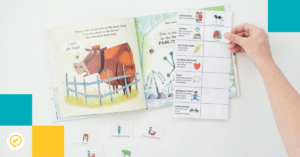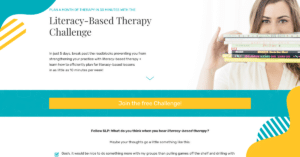Listen on Apple Podcasts Listen on Spotify
This Week’s Episode: How to Use Non-Word Repetition Tasks When Evaluating Culturally & Linguistically Diverse Students
This month I had the pleasure of chatting with Kallie Knight (@kknighttherapy), a school-based SLP, regarding evaluations for culturally and linguistically diverse students.
So far this month we discuss why different types of evaluations are important and different things to consider when evaluating CLD students, and tips on how to take good language samples for these students.
In today’s episode, Kallie shares tips on how to use Non-Word Rpetition takes when evaluating CLD students.
Let’s get to it!
Key Takeaways + Topics Covered
How to Use Non-Word Repetition Tasks
✓ Take a variety of non-words that are increasing in length and complexity (usually syllabic)
✓ Say it to the child and have them repeat *For consistency’s sake, record the word and play it for the student
✓ Similar to sentence recall
✓ This is a less biased approach, no linguistic bias, and measures phonological memory
✓ Don’t use Non-Word Repetition by itself as a diagnostic measure
Additional Links
Kallie Knight: @kknighttherapy
ASHA Leaders Project: Non-Word Repetition Module
SLP Now Membership
Bilinguistics
Gathercole et al 1994
Next Up in this Pod Series
4/5/22: Evaluations for Culturally & Linguistically Diverse Students: The Why
4/12/22: How to Use Language Samples When Evaluating Culturally & Linguistically Diverse Students
4/19/22: How to Use Non-Word Repetition Tasks When Evaluating Culturally & Linguistically Diverse Students
4/26/22: How to Use Dynamic Assessment When Evaluating Culturally & Linguistically Diverse Students
Subscribe & Review in iTunes
Are you subscribed to the podcast? If you’re not, subscribe today to get the latest episodes sent directly to you! Click here to make your listening experience auto-magic and as easy as possible.
Bonus points if you leave us a review over on iTunes → Those reviews help other SLPs find the podcast, and I love reading your feedback! Just click here to review, select “Ratings and Reviews,” “Write a Review,” and let me know what your favorite part of the podcast is.
Thanks so much!
Transcript
Speaker 1: Hello there and welcome to the SLP Now podcast, where we share practical therapy tips and ideas for busy speech language pathologists. Grab your favorite beverage and sit back as we dive into this week's episode. Now let transition into talking about non-word repetition tasks. So, Kallie, do you want to tell us a little bit about what those are and why you use them and what that looks like?
Kallie: Yeah, so non-word repetition tasks, actually it has the best name, because it explains exactly what it is. You're taking a variety of different non-words that are increasing in length and complexity, usually syllabic complexity, and you're just literally saying it to the child and having them repeat it. And then you're marking the accuracy of their repetitions. It's similar to your sentence recall tasks, but it's non-words. And so the idea behind using non-words is that it's a less biased approach because there's not this linguistic bias. It's just kind of phonological memory, is what they think this processing deficit that they're looking at here is. And these words can be weird. It depends on the protocol you use and there are a lot of them out there. But it might start with like some bi-syllabic words and they go to three syllables and go up to six, seven, some protocols go up to eight syllables.
Kallie: And they're just weird words, like [herbokdee 00:01:28], it makes no sense. And it's just them repeating exact, like I said, it's funny. So again, it's really quick because all you have to do is tell the kid, I'm going to tell you some really silly words. I want you to repeat what I say. And then tell them the word, and then they repeat it to you. And then you mark syllabic accuracy or the sound accuracy. And then you just give all the words.
Kallie: Most protocols have about 15 to 20 words. And like I said, they range in syllabic complexity. And then they usually for each protocol have a cut off score that's like, if you have this many syllables correct, you're probably like, okay, yeah. This many syllables correct, at risk. This many syllables, not likely to have a language disorder. Because this is the one thing, I would not use a non-word repetition task by itself as a diagnostic measure. I think it is helpful because it is a less biased option and it a processing dependent task. But I just think it doesn't give you a very comprehensive view and it's not perfect in terms of accuracy. So I'll put that plug in. This is just an easy way to add another measure to that triangulation of data that I talked about in the last episode. That does a little bit of information, I'll follow up with anything that I need to fine tune.
Speaker 1: Perfect. No, that's really helpful. And then in terms of the protocols, how did you find the ones that you used?
Kallie: For research that I did in undergraduate and graduate school and for my thesis, I used a protocol from Gathercole, et al. I think it's in like 1994. That one's old, but they have a lot of newer ones. If you go on the ASHA leaders project and you type in like non-word repetition, I think they have one or two non-word repetition protocols that you can just click and print out. And they have them in English, Spanish, and I think I saw that they have a Mandarin one now.
Speaker 1: Yeah. I just pulled it up. So they have one English, two Spanish and one Mandarin. And what was the one that you said you used
Kallie: It's from Gathercole, et al. I think it's like 1994. It's kind of old. But I don't think either one is any more right or wrong. That just happens to be the protocol that I am familiar with and use, just because I've used it for a long time. But those other ones are just as good. And I think those other ones are perhaps even better because they already have the protocol and the words marked out for you. So you just need to print it out. Something that I would recommend for non-word repetition tasks, this probably doesn't make a huge, huge difference, but because they are non-words and they're weird, for like reliability sake, sometimes I will take them and I will record myself and I'll do the whole thing on recording.
Kallie: Like, I'm going to tell you some funny words. I'm going to say it first, then I want you to say it back to me. And then I'll say the first word and pause for like three seconds, and then say the second word. And I'll go through it on a recording so that every time I have to give it to a kid, I just press play. And I make sure that the productions of those words are the same every single time. Some of these non-words are so, so weird and who knows, one person could produce them different than another. And it just makes it easy to say, oh, we're doing this real quick. Play. And you can gather all of the information you need in three to five minutes.
Speaker 1: Awesome. Yeah. And I'll link to the leaders project, which has all of those non-word repetition task protocols in the show notes. But they also have, it looks like they have two little video series too, showing an SLP administering that and with different children so we can see how different children might perform on it. Which I think would be super helpful if it's not something that you've done before, just like giving a little bit of that context. Super cool. Thank you so much for sharing that. And would you explain this to parents and teachers in the same way that you explained it to us? Or would you say anything different when you're writing up the evaluation or?
Kallie: To be honest, most of the time I just report it. And I report it as being an additional measure that tends to be less biased. If I try to explain any more than that, it's going to go over their heads. So I usually put the amount that really matters for their knowledge, and then I'll write out the results and then I'll put a key that's like, their score aligns with, you know, like in the average range or in like a risk range. Because really at the end of the day, could I put more information in there? Yes. But is it going to be particularly helpful to the parent? Probably not. So for me, as much as I would love to just data dump, because you and I and other SLPs would geek out and think that's cool, a lot of times I feel like parents and other professionals are like just tell me what I need to know and no more.
Speaker 1: Yeah. That's perfect. Anything else that you'd want to share related to non-word repetition task?
Kallie: I don't think so. Non-word rep, like I said, it's a pretty easy measure. I'll just reiterate again, to each his own. You choose what your clinical decisions are. I would not use this as a standalone measure. But it is a quick, easy measure just to add to your other informal measures. And it might not align with your other informal measures. The other two or three informal measures might be like, yeah, this kid definitely has a disorder. And then this one might come out in the at risk or average range, and don't freak out. It's okay, it's a triangulate of data. You're looking at all of your different parts. Just because one area comes out more normal doesn't mean you need to go in a tizzy and be like, oh my goodness, maybe this kid doesn't have a disorder. Maybe I need to second guess myself. And I feel like with non-word repetition tasks, this happens a little bit more often than other things for me. So don't freak out if it doesn't align with every other piece of data you have.
Speaker 1: Do you have any hypotheses on why that happens?
Kallie: I don't. And I mean, if you look at why they use non-word repetition tasks, they talk about it being a processing dependent task. We're looking at something that's really more measuring, I mean, really phonological working memory, but like a cognitive skill. And a lot of people propose that these deficits in cognitive skills are also present in students with language disorders. And so, that could be why. But then that doesn't always make sense because some kids who I'm like you definitely have a language disorder, end up doing, I mean, not well. I don't think anyone who's ever had a language disorder does well, but they might not hit those cutoffs. But you could get that in any test. You could give the Self to a, not a culturally and linguistically diverse kid, like someone who it is totally normed and made for, and they could still have a disorder but somehow have scored in the average range. So I think you always just have to look, take everything, not with a grain of salt, but look at things comprehensively.
Speaker 1: Perfect. I love that analysis. I think that's super helpful. It can just be like a relative strength for the student too. Like that's something that we can leverage. Thanks for listening to the SLP Now podcast. If you enjoyed this episode, please share with your SLP friends. And don't forget to subscribe to the podcast to get the latest episode sent directly to you. See you next time.
Sign up to receive email updates
Enter your name and email address below and I'll send you periodic updates about the podcast.




Reader Interactions